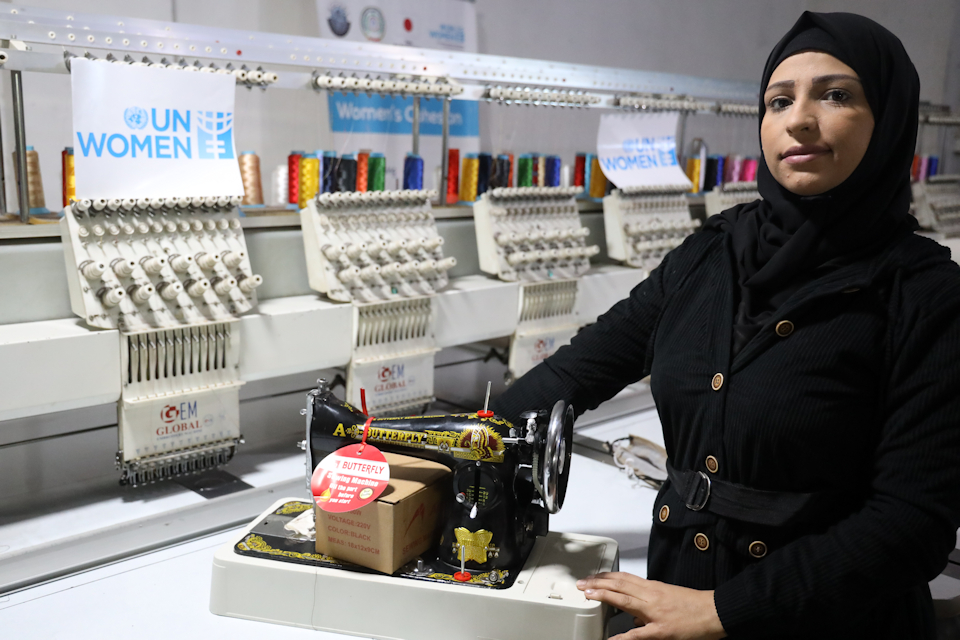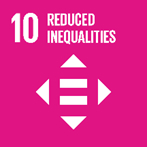From Where I Stand: “Prison was not easy, but with this support, I have been able to get past the trauma.”
Date:

Amal Sayyed, 26, thought that she would never recover from the trauma and stigma of having spent time in prison. She shares her journey on finding hope, with support from UN Women and its partners, despite her painful past.
![]()
In 2015 my sister and I began selling clothing in Tripoli to help sustain our families, and this work was quite successful. At one point, we recruited a young employee who would accompany my sister to purchase stock and she started stealing from the wholesalers. Not realizing how big a crime this was, my sister looked the other way. My sister and I were eventually arrested, even though I did not do anything. I was held accountable for not speaking about the theft. In early 2017, we were imprisoned for seven months, and later released on bail.
Society was merciless. My husband at that time was so embarrassed that he left me and refused to let my two children visit me in prison. His family boycotted me altogether. I suffered from depression in prison and cried every day; I was in shock because I had lost everything. My daughter was seven years old, and my son was five, at that time. I became so depressed that I stopped eating and drinking, which eventually prompted my husband to bring my kids to see me.
When I was released from prison, I found out that my husband had sold all my belongings except for my clothes. He sent them in a briefcase to my parents’ house. After a lot of discussion, he agreed to take me back under rigorous and restrictive conditions. I agreed to all of his terms simply because I wanted to be with my children. Living with him was very difficult. We lived under the same roof with his parents; they looked down on me and treated me like I was less than nothing. From mean comments to hiding me in a room whenever visitors were around, I was reminded every day that I had been in prison and that I should feel guilty. I finally decided to leave because I could not take him and his family punishing me anymore.In 2019, I married a man who supported my path to recovery and did not judge me for my past. My sister was the first to tell me about the training programme with Al Jamhiyaa al Loubnaniya Al Khairiya lil Islaah Wal Taahil, but my husband was hesitant, fearing that it would reignite painful memories. When we found out that I would earn a vocational certificate at the end of the training, he encouraged me.
My experience with the training was extraordinary. Even though it had been some time since I had been in prison, I still felt the stigma of having been in jail; I had become timid and reclusive, and I avoided social gatherings as much as possible. I started by attending the psychosocial support sessions, and the tailoring classes followed. From both of these I felt huge relief, emotionally and physically; it made me feel strong. I did not want to feel detached and ashamed of my past anymore.
Initially during the training, I could not keep up with everything the trainer was teaching us, but with her support and persistence, we were able to learn how to sew masks, pants, and all kinds of items. The cash assistance I received for the work I did, and the sewing machine given to me at the end of the training have equipped me to start making clothing items on my own. Now I hope to help in providing for our family.
Prison was not easy, but with this support, I have been able to get past the trauma. The certification has allowed me and my fellow trainees to prove ourselves and made us feel like we can be more than just former convicted inmates.”
Amal Sayyed was part of a UN Women programme catering to current as well as former female inmates in Lebanon, conducted in partnership with Tripoli-based NGO Al Jamhiyaa al Loubnaniya Al Khairiya lil Islaah Wal Taahil (The Philanthropic Lebanese Association for Reform and Rehabilitation) and made possible by the generous support of the Government of Japan.
The programme supports the rehabilitation of prisoners, and their transition from prison back into society. It includes psychosocial support sessions as well as skills-based training in sewing, and cooking. At the end of the six-month training, trainees were provided with assets to enable them to start their own businesses.
The UN Women programme aims to support former female inmates in Lebanon to enter the labor force and restart their lives, which can be particularly hard on female prisoners or former prisoners, who face discrimination as a result of their incarceration, amidst an economic crisis in Lebanon, which has seen women’s unemployment rate rise from 14.3 per cent before the crisis to 26 per cent by September 2020, according to a recent brief by UN Women.
Amal’s story illustrates the importance of achieving Sustainable Development Goal (SDG) 5 on gender equality and the empowerment of women; and SDG 10, which calls for reducing inequalities in income as well as those based on age, sex, disability, race, ethnicity, origin, religion or economic or other status.
